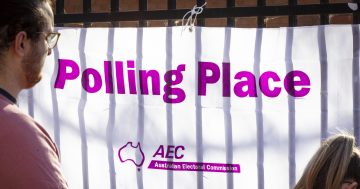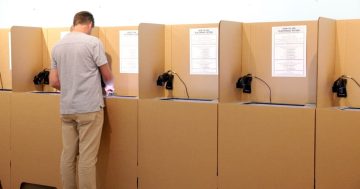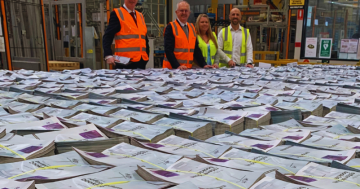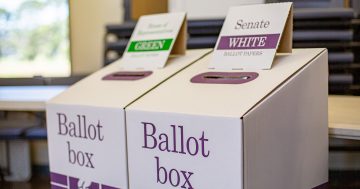
Governor-General Sam Mostyn and Acting AEC Commissioner Jeff Pope at AEC headquarters in February: beware of unsolicited voting applications. Photo: GG Facebook.
The Australian Electoral Commission is warning voters about using unsolicited postal vote application forms from political parties during these early days of the federal election campaign, saying the practice raises privacy concerns and could also delay people getting onto the electoral roll in time.
Unsolicited application forms, which can be received via SMS, email, or mailbox, are sent by a political party or candidate and are reportedly used by political parties to collect data about voters before being forwarded to the AEC.
The AEC does not issue them, and while it is only ever the AEC that distributes postal vote ballot papers, there are no rules against parties sending out application forms.
This is allowed under the Commonwealth Electoral Act, but there is often concern about the timeliness of applications getting to the AEC and the privacy of an applicant’s details.
The AEC’s advice is to apply directly on the AEC website.
Acting Australian Electoral Commissioner Jeff Pope said voters need to be aware of where postal vote applications are coming from.
“The AEC does not distribute unsolicited postal vote applications. If you receive an application form for a postal vote in the mail or via SMS, it hasn’t come from the AEC,” he said.
“People should always carefully consider what they’re doing with their personal information.
The AEC takes privacy seriously and operates under the Privacy Act. Political parties don’t have to.
“Voters ask us how their mobile number is known by a political party. The AEC has not provided it.
“If you need a postal vote, the easiest way to apply for one is to do it on the AEC’s website. It takes a few minutes and guarantees that your personal information stays secure with us.”
The Commissioner said federal elections are intended to be in-person events, with postal voting available only if you can’t get to a polling place on the day or to an early voting location in the two weeks prior to polling day.
He said Australia has some of the best in-person voting options in the world. If a voter can turn up to a voting centre, then that is what they must do.
It may not always be clear to people receiving a postal vote application from a political party that eligibility criteria exist for postal voting.
“Concerns about party postal vote applications through unsolicited outreach is the number one complaint we hear from voters at almost every federal election,” Mr Pope said.
“The AEC has shared these concerns with parliamentary committees in the past and will continue to do so in the future.”
The AEC also pointed out that party-issued postal vote application campaigns, through SMS or letter, have the potential to mislead voters into thinking that they are official documents sent by the AEC.
At past elections, some have featured misleading colours and even directed voters to non-AEC websites.
With the 2025 federal election now formally underway, the AEC is also warning political parties, candidates and supporters to adhere to the rules around campaigning and to engage respectfully.
Mr Pope said that civility has always been a key part of what makes Australian elections precious and admired internationally.
“Political campaign messages and campaign workers are a critical component of a federal election,” he said.
“Our experience is that in almost every instance, campaigning activity adheres with the law and is done in a civil manner.
“We want to see this continuing to be the case in 2025.”
The AEC has continually expressed a preference for candidates, political parties and other campaigners not to use the colour purple in their communication with voters.
“The use of the colour purple itself is not prohibited, but it should absolutely not be used in a way that could be confused for AEC communication,” he said.
“If this was to occur, depending on the exact circumstances, it could be a breach of s329 of the Electoral Act.”
There are no laws relating to truth in federal election communication, with one exception. Section 329 of the Electoral Act addresses misleading or deceptive communication specific to the act of casting a vote.
“The distinction for us is really clear – if people are communicating about the electoral process, then it’s appropriate for the AEC to be an active part of the conversation,” Mr Pope said.
“If communication can mislead a voter about how to complete a ballot paper, then there is a potential offence that could apply under electoral laws.”
Mr Pope was appointed the Acting Electoral Commissioner in December 2024 following the resignation of former commissioner Tom Rogers.



















